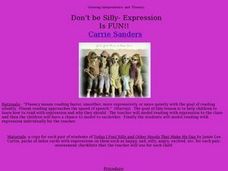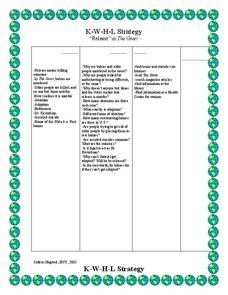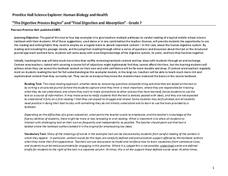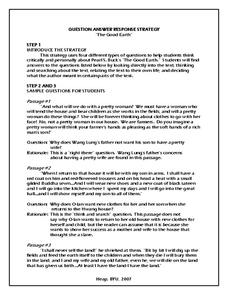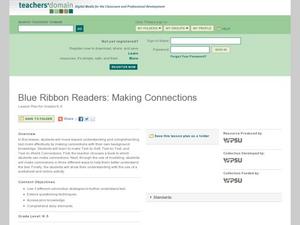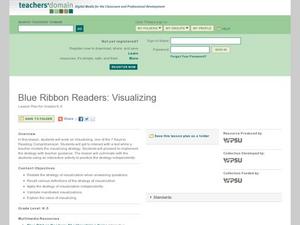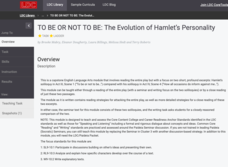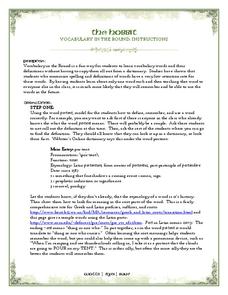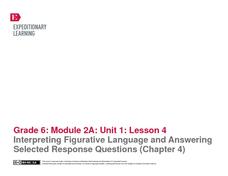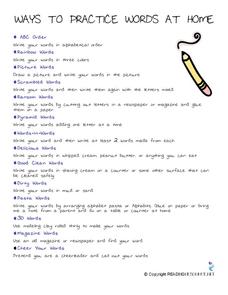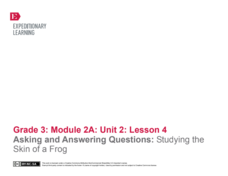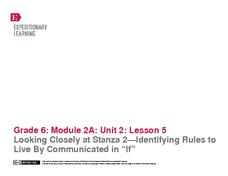Curated OER
Poetry As Oral Performance
Reciting poetry is a great way to build oral language skills and build classroom community. Pupils look at the text elements of poetry and choose a poem to read aloud. They focus on rhythm, fluency, and expression. This is a great way to...
Curated OER
Don't Be Silly–Expression is Fun!
As children observe the teacher reading Today I Feel Silly and Other Moods That Make My Day, they take note of the role punctuation plays in the emotion or expression used. They then take turns reading a book with a partner so they can...
Novelinks
Man's Search for Meaning: ReQuest Procedure Questioning Strategy
As part of a study of Viktor Frankl's Man's Search for Meaning, class members respond to, and craft, higher-level comprehension questions based on passages from the text.
Curated OER
The Giver: K-W-H-L Strategy
Explore the theme of release and death in Lois Lowry's The Giver with a K-W-H-L chart. After noting what they already know, kids come up with a list of questions about topics that they would like to know about, as well as how they will...
Savvas Learning
"The Digestive Process Begins" and "Final Digestion and Absorption"
Want your class to digest text more thoroughly? Middle schoolers learn about the digestive system in the lesson and reinforce informational text reading skills through a variety of strategies. They engage in a close reading approach,...
Novelinks
The Good Earth: Biopoem Strategy
To gain a better understanding of characters in Pearl Buck's The Good Earth, kids create a biopoem for one of her characters.
Texas Center for Learning Disabilities
Fifth-Grade Text-Based Intervention
Look no further—here's a resource packed with focused intervention materials for special education teachers. A unique unit plan provides 10 days of structured text-based intervention strategies for fifth-grade learners. Each 30-minute...
ReadWriteThink
Word Recognition Strategies Using Nursery Rhymes
As a class, scholars read the poems, Humpty Dumpty, Peter, Peter, Pumpkin Eater, and Jack and Jill, in order to identify words with the same ending sound. Using their rhyming skills, learners brainstorm additional words from word...
Curated OER
The Tempest: The K-W-H-L Strategy
What does your class want to know about William Shakespeare's The Tempest? Host a discussion about the questions high schoolers have about the play with a KWHL activity in which they write down their inquiries, what they already know,...
Novelinks
The Good Earth: Question Answer Response Strategy
Readers of Pearl Buck's The Good Earth craft and answer "Right There," "Think and Search," "On Your Own," and "Author and You" questions.
EngageNY
Main Ideas in Informational Text: Analyzing a Firsthand Human Rights Account
Although this is part of a series, lesson plan nine has your class take a break from their close study of the Universal Declaration of Human Rights (UDHR) text to read the firsthand account “Teaching Nepalis to Read, Plant, and Vote” by...
Curated OER
Blue Ribbon Readers: Making Connections
Model for young readers how to make the shift from passive to active reading by making text-to-self and text-to-text connections. After a series of activities that provide guided practice, the focus shifts to making text-to-words...
Curated OER
Blue Ribbon Readers: Visualizing
Introduce young readers to the comprehension strategy of visualizing by asking them to think about a place that makes them happy. After illustrating or using words to describe this place, the class moves on to an interactive game using...
Literacy Design Collaborative
To Be or Not to Be: The Evolution of Hamlet’s Personality
How does Hamlet's state of mind change over the course of Shakespeare's most famous revenge tragedy? After a close reading of Hamlet's soliloquies in Act III, scene 1 and Act IV, scene iv, class members engage in a Paideia/Socratic...
Novelinks
The Hobbit: Vocabulary in the Round
Blundering, audacious, obscurest. Class members develop strategies for teaching each other vocabulary words drawn from The Hobbit.
English Worksheets Land
Blaze a Trail
Compare and contrast different ways that sources present information with a reading worksheet. After readers view two short passages about blazing a trail, they note the information they found in each selection.
EngageNY
Interpreting Figurative Language and Answering Selected Response Questions (Chapter 4)
To prepare for an assessment of how well individuals are progressing with their ability to identify and analyze figurative language and its effect on tone and meaning, pairs work through Chapter Four of Christopher Paul Curtis'...
Reading Resource
Ways to Practice Words at Home
Looking for more ways to practice writing words? A list of 27 strategies will engage learners of any level. Kids can choose between writing their words in peanut butter, criss-crossing them with words that share common letters, and...
Curated OER
Beary Necessary Rules
Young pupils learn about classroom rules as they also practice active reading strategies and reading comprehension skills. This instructional activity begins with a thorough reading of the story Brown Bear, Brown Bear, What Do You...
EngageNY
Introducing “If” and Noting Notices and Wonders of the First Stanza
After reading chapter 14 of the story Bud, Not Buddy by Christopher Paul Curtis, scholars take part in a read-aloud of the poem If by Rudyard Kipling and compare it to the reading of Bud, Not Buddy. Learners then go deeper into the poem...
Thoughtful Education Press
Compare and Contrast
Encourage readers to compare and contrast the information that they find in informational text with a variety of reading passages and worksheets. Learners read all about subjects in science, social studies, and literature before...
EngageNY
Asking and Answering Questions: Studying the Skin of a Frog
English language arts and science combine in a lesson that focuses on asking and answering questions about frog skin. Discussion, a read-aloud, and partner work lead the way towards a three-page worksheet that tests learners'...
K12 Reader
What Happens Next?
While your students may not be psychics, that doesn't mean they can't predict what will happen next in a story. To hone this important reading comprehension skill, young learners read a series of three short passages before writing a...
EngageNY
Looking Closely at Stanza 2—Identifying Rules to Live By Communicated in “If”
Pupils take part in a close reading of the poem, If by Rudyard Kipling, in which they delve deep into its meaning and identify its rules to live by. As the grand discussion progresses, learners then relate the poem's rules with those...
Other popular searches
- Reading Strategies Inferring
- 6th Grade Reading Strategies
- Active Reading Strategies
- Teaching Reading Strategies
- Before Reading Strategies
- 12 Reading Strategies
- Reading Strategies Text Talk
- Early Reading Strategies
- Silent Reading Strategies
- Pre Reading Strategies
- Using Reading Strategies
- 6 Active Reading Strategies



